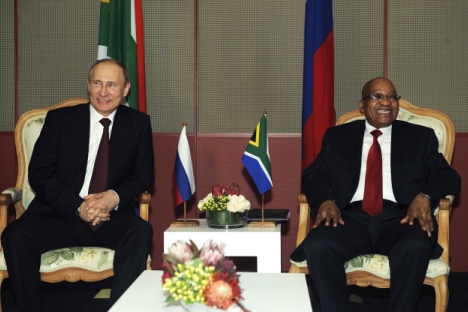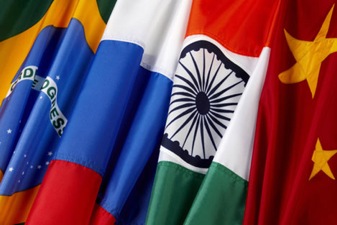BRICS Bank: A reality check

The emergence of BRICS indicates that the world is no more confined to ideological blocs or rivalries, rather the world has become more poly-centric. Source: Reuters
The South African Finance Minister, Pravin Gordhan expressed jubilation on the eve of the BRICS summit saying: “We made very good progress, the leaders will announce the details (about the BRICS bank).” The BRICS bank is poised to be an alternate economic pole in the post-Cold War world. With this sentiment, perhaps none of the members of the grouping would disagree. As the international financial system is not in a good shape, with economies in the parts of the north are in shambles, it is perhaps a prudent decision on part of the leaders of the grouping to think of an alternative system in comparison to the Bretton Woods structures of International Monetary Fund (IMF) and World Bank.
As the two-day summit takes place in the port city of Durban in South Africa, the expectations certainly galore. The media is abuzz that many novel things will be announced, among which the creation of the bank will be a core achievement of the summit. South Africa expects that the bank will play a key role in its development in funding projects like infrastructure. The South African President, Jacob Zuma appeared enthusiastic about the prospects of the bank and argued, “BRICS provides an opportunity for South Africa to promote its competitiveness.”
Certainly a lot of deliberations and negotiations have gone into the bank idea. India’s Finance Minister, P. Chidambaram told the press that “We are reporting to the Heads (of governments) that the BRICS bank is feasible and viable.” The tentative plan is that each country will have to contribute seed money of $10billion. The bank is expected to emerge as a flagship bank not only for the members of the grouping but also of the whole developing south. Chinese President, Xi Jinping during his speech in Tanzania, before arriving at Durban summit, elaborated his country’s role as an emerging power and argued that his country is interested in the growth of Africa, while respecting their ‘dignity and independence.’ With $8.25 trillion, China’s GDP is almost twenty times higher than South Africa at $390 billion.
An impartial assessment would make it clear that further deliberations need to go into the making of the bank. The establishment of the bank can be a cherished goal. But ideals themselves do not make reality as appropriate flesh and bone have to be supplied to give concrete shape to ideas. My assessment reveals that there are three areas on which fleshing out of differences between the members of the grouping need to take place. These areas include: design, leadership and location. The current summit, as reports suggest, may include in its final statement the idea of establishment of bank. But, unless these three issues are addressed the BRICS bank idea may not be an enduring one.
The design of the bank has not yet been fully finalised. Perhaps these questions are to be analysed in detail. First, what will be the criteria for membership of the bank? Will it be confined only to the members of the grouping, or any country including developing and developed be allowed to be a member of the bank? Will there be a system of quota as per the size of economy of participating country as in case of Bretton Woods structures, or all participating members will have equal voice? Will the bank allow differential interest rates in sanctioning loans to countries, or will it have a standard interest rate through all cases? Unless these issues are fleshed out in detail, the problems will galore later even if the bank is established. Russian Finance Minister, Anton Siluanov struck the right chord when he argued, “There is positive movement, but there is no decision on the creation of the bank”, further adding “Instructions will be given to speed up the process”. He hinted that in the forthcoming G-20 meeting in April the members will further deliberate on this issue.
As per the leadership of the bank is concerned, it more veers around the decision making process within the bank. Unless there is coordination among the members on this issue as to what has to be the exact modicum in arriving a decision, the bank will fail to realise its purpose. If the bank is modeled in the line of Bretton Woods structures, the very purpose of the bank will be put into question as it is aimed at providing a playing field to developing countries. The very BRICS members have questioned the working of IMF and World Bank. If the models of these banks are adopted, then certainly China will have more weight than other members of the grouping. The point then is whether the bank will be led by a particular member, China, or it has to be a collective body with each members having equal voice. Unless this issue is settled, the bank will have to confront problems in future.
The location issue is quite significant as well. Russian Finance Minister, Anton Siluanov argued that “A decision on the location of the bank and funding still needs to be made.” The location of the bank in a city will not only raise the profile of that city but also of the country in which it is located; it will provide a vantage point to the country itself. An analogy can be made here. The location of the United Nations and Bretton Woods structures in New York in the US has provided the country advantages. Had these institutions been established in a city in Asia or Africa the politics among nations perhaps could have been different. There seems to be underlying friction as to the site for this bank. There may be branches of the bank in all member countries though headquarter of the bank certainly will have its special charm. A news report highlighted the differences and pointed out that, instead of the detractors of the grouping, it is the differences within the grouping that have marred the evolution of consensus among the members. This lack of consensus is a major obstacle against establishment of the bank.
The BRICS idea is certainly a trend setter in world politics. Despite its myriad fallacies, it is no doubt that the emergence of BRICS indicates that the world is no more confined to ideological blocs or rivalries, rather the world has become more polycentric. The very philosophy underlying BRICS needs to be applied in the establishment of the bank. It will be fine if the final statement of the summit mentions the establishment of the bank in near future, while leaving scope for further deliberations on the issue. Perhaps by the time next summit takes place in 2014, these issues will be sorted out, and BRICS will add bricks to the bank and emerge a more solid, vibrant and effective international power centre.
Dr Debidatta Aurobinda Mahapatra is an Indian commentator. His areas of interests include India-Russia relations, conflict and peace, and strategic aspects of Eurasian politics.
All rights reserved by Rossiyskaya Gazeta.
Subscribe
to our newsletter!
Get the week's best stories straight to your inbox
